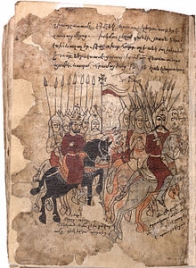Pap of Armenia
Thursday, March 10, 2022
Pap, also known as Papas (353–374) was King of Armenia from 370 until 374. A representative of Armenian Arsacids, his reign saw a short, but notable period of stabilization after years of political turmoil.
Pap was the son born to the Arsacid monarch Arsaces II (Arshak II) and his wife Pharantzem (P'arandzem),who was his third known wife. Prior to his father's Armenian kingship, Arsaces II married an unnamed woman who appeared to have died before the year 358 by whom he had a son called Anob, thus was Pap's older paternal half-brother. The father of Pap served as Roman Client King of Armenia from 350 until 368. Pap is the only known child born to Arsaces II during his Armenian Kingship.
He was born and raised in Armenia and little is known on his early life. Armenian historian of the 5th century Faustus of Byzantium in his writings History of the Armenians (Book IV, Chapter 15), states that the parents of Pap nourished him during his childhood and when he reached puberty he became robust.
Pap was named in honor of Pap, a brief Catholicos in 348 who was Pap's late paternal relative and the first son of Saint Husik. Saint Husik was the grandfather of the Catholicos, St. Nerses I.
Pap, like his father, aggressively pursued a policy of Christian Arianism. He was struggling to rule a kingdom that was recently dismantled by Shapur II; his actions to keep a tight grip on power led to his downfall. Pap poisoned the popular Armenian Catholicos Nerses in 373, who was a very close Roman ally. The poisoning of Nerses was one of the measures that Pap took to restrain the excessive power of the Church, which included the confiscation of rich estates which were attached to the Holy See. Pap had nominated a certain Husik as a replacement and sent him for consecration in Caesarea. The bishop of Caesarea Basil refused to consecrate the nominee but Valens requested that Basil quickly resolve the situation by finding a new nominee acceptable to Pap. Basil failed to do so and the Roman see of Caesarea effectively lost its traditional role of consecrating the Catholicos of Armenia. Pap's refusal to cooperate with Basil angered Valens. In addition, Pap demanded control over Caesarea and twelve other Roman cities including Edessa as former Arsacid domains while openly courting Persia. Valens decided to execute Pap and invited him to a meeting in Tarsus. Pap arrived with 300 mounted escorts but quickly became anxious when he found out the Emperor was not there in person, fleeing back to Armenia.
Terentius sent two generals with scutarii (shielded cavalry) familiar with the local terrain after Pap, an Armenian named Danielus and an Iberian named Barzimeres who failed to capture and execute Pap. Both generals gave an excuse that Pap had used magical powers to avoid capture and used a dark cloud to mask his party. Faustus in his Epic Histories also claimed that Pap was possessed by devs (demons). This could have simply been an attack against Pap's sympathies towards Arians and pagans. Valens then assigned Traianus to gain Pap's confidence and murder him. Traianus murdered Pap in 374 during a banquet which he had organized for the young king. Marcellinus Ammianus drew parallels between the treacherous murder of the Quadi King Gabinius by Valentinian I and the murder of Pap by Valens,who also wrote that the murder of Pap haunted Valens prior to the Battle of Adrianople.
The Armenian nakharars still loyal to Pap did little to protest as a result of a large Roman army present in Armenian territory. The new Roman nominee for a king was accepted virtually by everyone. It was another Arsacid and nephew of Pap, who grew up in Rome named Varasdates (Varazdat) that began to rule under the regency of Mushegh Mamikonian. The Mamikonians were notoriously pro-Roman. Shapur II had long been courting Pap and he was infuriated when Pap was murdered and a new Arsacid placed on the Armenian throne instead.
Pap married an Armenian noblewoman called Zarmandukht, who through marriage became queen consort of Armenia. Zarmandukht bore Pap two sons: Arsaces III (Arshak III) and Vologases.





